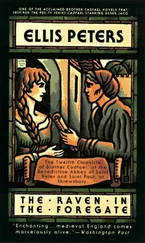Ellis Peters - The Potter's Field
Здесь есть возможность читать онлайн «Ellis Peters - The Potter's Field» весь текст электронной книги совершенно бесплатно (целиком полную версию без сокращений). В некоторых случаях можно слушать аудио, скачать через торрент в формате fb2 и присутствует краткое содержание. Жанр: Исторический детектив, на английском языке. Описание произведения, (предисловие) а так же отзывы посетителей доступны на портале библиотеки ЛибКат.
- Название:The Potter's Field
- Автор:
- Жанр:
- Год:неизвестен
- ISBN:нет данных
- Рейтинг книги:4.5 / 5. Голосов: 2
-
Избранное:Добавить в избранное
- Отзывы:
-
Ваша оценка:
- 100
- 1
- 2
- 3
- 4
- 5
The Potter's Field: краткое содержание, описание и аннотация
Предлагаем к чтению аннотацию, описание, краткое содержание или предисловие (зависит от того, что написал сам автор книги «The Potter's Field»). Если вы не нашли необходимую информацию о книге — напишите в комментариях, мы постараемся отыскать её.
The Potter's Field — читать онлайн бесплатно полную книгу (весь текст) целиком
Ниже представлен текст книги, разбитый по страницам. Система сохранения места последней прочитанной страницы, позволяет с удобством читать онлайн бесплатно книгу «The Potter's Field», без необходимости каждый раз заново искать на чём Вы остановились. Поставьте закладку, и сможете в любой момент перейти на страницу, на которой закончили чтение.
Интервал:
Закладка:
‘Wet and muddy and cold, I daresay,’ said Aline, ruefully smiling, ‘and probably cursing heartily, but he’s whole and well, or was when his archer left him. That’s one thing to be said for this tedious business, as you called it, such losses as there are have been de Mandeville’s. But too few to do him much harm.’
‘Not enough,’ Cadfael said consideringly,’to be worth the king’s while for much longer. I think, Aline, you may not have to wait long to have Hugh home again.’
Giles pressed a little closer and more snugly into his godfather’s side, but said nothing. ‘And you, my lord,’ said Cadfael, ‘will have to hand over your manor again, and give account of your stewardship. I hope you have not let things get out of hand while the lord sheriff’s been away.’
Hugh’s deputy made a brief sound indicative of scorn at the very idea that his strict rule should ever be challenged. ‘I am good at it,’ he stated firmly. ‘My father says so. He says I keep a tighter rein than he does. And use the spur more.’
‘Your father,’ said Cadfael gravely, ‘is always fair and ungrudging even to those who excel him.’ He was aware, through some alchemy of proximity and affection, of the smile Aline was not allowing to show in her face.
‘Especially with the women,’ said Giles complacently.
‘Now that,’ said Cadfael, ‘I can well believe.’
King Stephen’s tenacity, in any undertaking, had always been precarious. Not want of courage, certainly, not even want of determination, caused him to abandon sieges after a mere few days and rush away to some more promising assault. It was rather impatience, frustrated optimism and detestation of being inactive that made him quit one undertaking for another. On occasion, as at Oxford, he could steel himself to persist, if the situation offered a reasonable hope of final triumph, but where stalemate was obvious he soon wearied and went off to fresh fields. In the wintry rains of the Fens anger and personal hatred kept him constant longer than usual, but his successes were meagre, and it was borne in upon him by the last week of November that he could not hope to finish the work. Floundering in the quagmires of those bleak levels, his forces had certainly closed in with enough method and strength to compress de Mandeville’s territory, and had picked off a fair number of his rogue troops when they ventured out on to drier ground, but it was obvious that the enemy had ample supplies, and could hold off for a while even from raiding. There was no hope of digging them out of their hole. Stephen turned to changed policies with the instant vigour he could find at need. He wanted his feudal levies, especially any from potentially vulnerable regions, such as those neighbour to the Welsh, or to dubious friends like the Earl of Chester, back where they were most useful. Here in the Fens he proposed to marshal an army rather of builders than soldiers, throw up a ring of hasty but well-placed strongpoints to contain the outlaw territory, compress it still further wherever they could, and menace Geoffrey’s outside supply lines when his stores ran low. Manned by the experienced Flemish mercenaries, familiar with fighting in flat lands and among complex waterways, such a ring of forts could hold what had been gained through the winter, until conditions were more favourable to open manoeuvring.
It was nearing the end of November when Hugh found himself and his levy briskly thanked and dismissed. He had lost no men killed, and had only a few minor wounds and grazes to show, and was heartily glad to withdraw his men from wallowing in the quagmires round Cambridge and set out with them north-westward towards Huntingdon, where the royal castle had kept the town relatively secure and the roads open. From there he sent them on due west for Kettering, while he rode north, heading for Peterborough.
He had not paused to consider, until he rode over the bridge of the Nene and up into the town, what he expected to find there. Better, perhaps, to approach thus without expectations of any kind. The road from the bridge brought him up into the marketplace, which was alive and busy. The burgesses who had elected to stay were justified, the town had so far proved too formidable to be a temptation to de Mandeville while there were more isolated and defenceless victims to be found. Hugh found stabling for his horse, and went afoot to look for Priestgate.
The shop was there, or at least a flourishing silversmith’s shop was there, open for business and showing a prosperous front to the world. That was the first confirmation. Hugh went in, and enquired of the young fellow sitting at work in the back of the shop, under a window that lit his workbench, for Master John Hinde. The name was received blithely, and the young man laid down his tools and went out by a rear door to call his master. No question of any discrepancy here, the shop and the man were here to be found, just as Sulien had left them when he made his way west from Ramsey.
Master John Hinde, when he followed his assistant in from his private quarters, was plainly a man of substance in the town, one who might well be a good patron to his favoured religious house, and on excellent terms with abbots. He was perhaps fifty, a lean, active, upright figure in a rich furred gown. Quick dark eyes in a thin, decisive face summed up Hugh in a glance.
‘I am John Hinde. How can I help you?’ The marks of the wearisome lurking in wet, windswept ambushes, and occasional hard riding in the open, were there to be seen in Hugh’s clothes and harness. ‘You come from the king’s muster? We have heard he’s withdrawing his host. Not to leave the field clear for de Mandeville, I hope?’
‘No such matter,’ Hugh assured him,’though I’m sent back to take care of my own field. No, you’ll be none the worse for our leaving, the Flemings will be between you and danger, with at least one strongpoint well placed to pen them into their island. There’s little more or better he could do now, with the winter coming.’
‘Well, we live as candles in the breath of God,’ said the silversmith philosophically, ‘wherever we are. I’ve known it too long to be easily frightened off. And what’s your need, sir, before you head for home?’
‘Do you remember,’ said Hugh, ‘about the first or second day of October, a young monk sheltering here with you overnight? It was just after the sack of Ramsey, the boy came from there, commended to you, he said, by his abbot. Abbot Walker was sending him home to the brother house at Shrewsbury, to take the news of Ramsey with him along the way. You remember the man?’
‘Clearly,’ said John Hinde, without hesitation. ‘He was just at the end of his novitiate. The brothers were scattering for safety. None of us is likely to forget that time. I would have lent the lad a horse for the first few miles, but he said he would do better afoot, for they were all about the open countryside like bees in swarm then. What of him? I hope he reached Shrewsbury safely?’
‘He did, and brought the news wherever he passed. Yes, he’s well, though he’s left the Order since, and returned to his brother’s manor.’
‘He told me then he was in doubts if he was on the right way,’ agreed the silversmith. ‘Walter was not the man to hold on to a youngster against his inclination. So what is it I can add, concerning this youth?’
‘Did he,’ asked Hugh deliberately, ‘notice a particular ring in your shop? And did he remark upon it, and ask after the woman from whom you had bought it, only ten days or so earlier? A plain silver ring set with a small yellow stone, and bearing initials engraved within it? And did he beg it of you, because he had known the woman well from his childhood, and kept a kindness for her? Is any part of this truth?’
Читать дальшеИнтервал:
Закладка:
Похожие книги на «The Potter's Field»
Представляем Вашему вниманию похожие книги на «The Potter's Field» списком для выбора. Мы отобрали схожую по названию и смыслу литературу в надежде предоставить читателям больше вариантов отыскать новые, интересные, ещё непрочитанные произведения.
Обсуждение, отзывы о книге «The Potter's Field» и просто собственные мнения читателей. Оставьте ваши комментарии, напишите, что Вы думаете о произведении, его смысле или главных героях. Укажите что конкретно понравилось, а что нет, и почему Вы так считаете.












